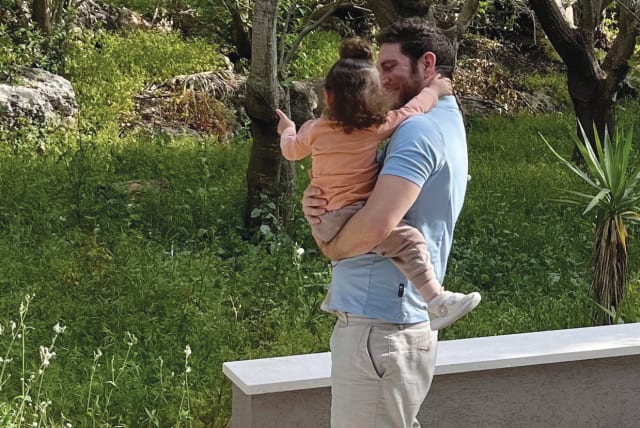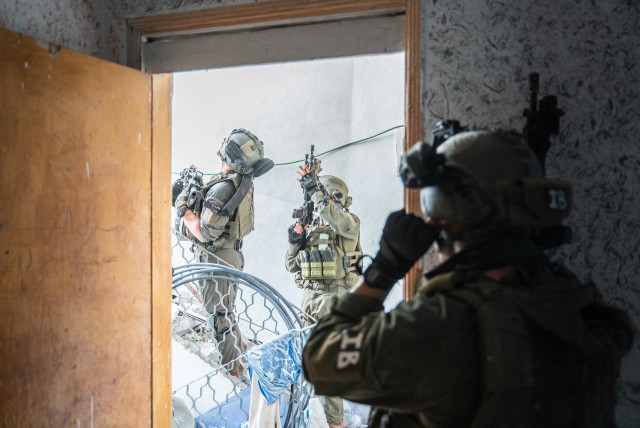From battle to home: An IDF reservist back from Gaza adjusts to family life

Despite all these ongoing challenges, Michael has managed to keep his positive outlook and cheery disposition.
Recently the Magazine caught up with IDF combat reservist Michael, once again, to find out how he’s been managing since he returned from Gaza at the end of January. Readers may recall the challenges he faced in the immediate aftermath of his release from miluim (reserves) as he struggled to adjust to civilian life.
The impending birth of his second child, settling into a new home, and uncertainty in the workplace were some of the practical difficulties that Michael had to contend with while suffering a host of mental and physical health issues stemming from the war.
As he still has significant back, groin, and hamstring problems, he tried massage and Watsu (water and shiatsu) treatment, but sadly, neither has helped alleviate the pain, he says.
Another problem that has come to light over the past weeks is a suspected loss of hearing “from all of the explosions and gunfire in Gaza,” Michael told the Magazine. “My wife keeps saying that I’ve gone deaf and need to go get my hearing checked out – but it sounds so cliché for married couples,” he joked.
As hearing loss among soldiers is fairly common, “the army put out a link for it at the beginning, but I didn’t give it the highest priority with everything going on and still haven’t got around to it,” he added.
Fortunately, Michael’s wife has been “incredibly patient and understanding” about this and his other problems, such as random bouts of forgetfulness and absent-mindedness.
“The short-term memory loss is still there,” he lamented. “My wife might ask me to bring something down and I say ‘Sure, will do,’ but immediately forget. It happens quite a lot and is terribly frustrating for me.”
Nevertheless, the couple are delighted to be back together, living under the same roof again.
"It feels more normal to be home now"
WHEREAS BEFORE, when he served on the front lines in Gaza, “it felt more normal to be in Gaza than to be at home.” Now, he says, “it feels more normal to be home, and Gaza feels like a distant memory.”
To add to his delight at being home, once again Michael enjoys a “wonderful” relationship with his young daughter, who found her father’s extended absences extremely difficult to bear: “I make her laugh like no one else can.”
And with the birth of their second child expected “any day now,” I could hear the relief in his voice when he confirmed that the renovations to their new house were almost complete. The boxes they had been living out of have finally been unpacked, everything has been put away, and the place “finally feels like home,” he said, giving them a “fresh start.”
Although the future is uncertain, Michael tries not to think about what’s next, preferring instead to “live in the present.”
This can be difficult, however, as he follows developments closely as part of his job, which “means that every time I read about the government lengthening reserve service or an escalation of hostilities in the North, it makes me worry.”
Despite this, Michael’s commitment to his country is unwavering, and he wouldn’t hesitate to answer the call, should it come again.
“I’m motivated to see the war through,” he said defiantly. “It has to be won, and everyone has to fight if they’re capable.”
UPON THEIR discharge, the army regularly followed up with Michael and his comrades, offering mental health support – although this has tailed off recently. He didn’t take up the offer, however, as overall he’s “been fine,” if somewhat preoccupied with the situation.
“I can’t separate myself from the war,” he lamented. “I’m obsessed with everything that’s going on.”
Instead of fighting in Gaza, Michael has now turned his attention to the “media war” by posting “all the time on social networks,” such as Facebook, X, and Instagram, causing his wife to complain that he’s never off his phone.
Nevertheless, Michael feels that it’s his duty to engage in hasbara (advocacy) on behalf of his country and his people: “Israelis, Jews, and our supporters must fight the media war.”
When asked whether he felt his media presence made a difference, he was emphatic in his response.
“I am informing and providing commentary about the war and local developments, and providing a voice to those who are either too afraid or too uninformed to say these things,” he told the Magazine, referring to the “stories” he posts on his social media platforms.
Having taken the war “from Gaza to online,” Michael is careful to maintain a respectful and balanced tone: “I try to acknowledge the suffering of Palestinian civilians, while simultaneously stressing the need to completely dismantle Hamas’s military capabilities for peace to stand a chance.”
While his wife would prefer him to stop or at least slow down a bit, he remains undeterred. “It’s a war, and we have to do things outside our regular routine,” he stated unapologetically.
Settling back into his regular work routine is something that Michael fears may be short-lived. Although he’s back at work as a policy adviser for a European government, it hasn’t been smooth sailing and he’s still worried about his future there.
A policy change regarding miluim employment during the war has afforded him some additional job security, however, as soldiers can’t be fired for two months after returning from service, depending on how many days they served.
Nevertheless, his employment status remains uncertain. And then there’s the knotty issue of paternity leave when the new baby arrives, which complicates matters further on the work front.
Nevertheless, despite all these ongoing challenges, Michael has managed to keep his positive outlook and cheery disposition, confirming, “I’m happier and in better spirits now that we’re all together.”
Jerusalem Post Store
`; document.getElementById("linkPremium").innerHTML = cont; var divWithLink = document.getElementById("premium-link"); if (divWithLink !== null && divWithLink !== 'undefined') { divWithLink.style.border = "solid 1px #cb0f3e"; divWithLink.style.textAlign = "center"; divWithLink.style.marginBottom = "15px"; divWithLink.style.marginTop = "15px"; divWithLink.style.width = "100%"; divWithLink.style.backgroundColor = "#122952"; divWithLink.style.color = "#ffffff"; divWithLink.style.lineHeight = "1.5"; } } (function (v, i) { });

